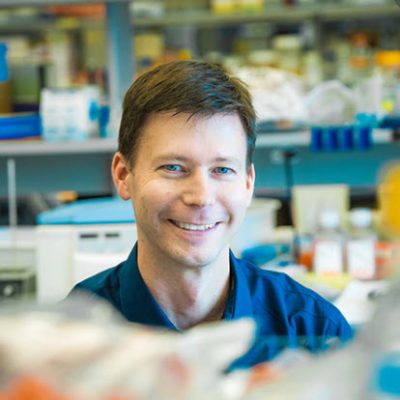ViaCyte Inc., a San Diego-based firm focusing on cellular therapy and regenerative medicine has appointed Dr. Timothy Kieffer as its new Chief Scientific Officer.
The recruitment became official on Sept. 13, with an announcement on social media. Dr. Kieffer will bring his deep knowledge of gene and cell therapies, regenerative medicine, diabetes applied research, and industry experience to lead ViaCyte’s scientific team focused on delivering and commercializing clinical interventions for diabetes.
“This is a tremendous opportunity for me to gain industry experience in translational medicine,” Kieffer, leader of the LSI’s Diabetes Research Group, and Professor, Cellular & Physiological Sciences and Surgery at UBC said in an email exchange. “ViaCyte is leading the path towards stem cell-based products for diabetes, with immense pre-clinical and clinical expertise.”
In a press release issued by ViaCyte, Chief Executive Officer Michael Yang welcomed Kieffer as a “global thought leader and one of the foremost experts in developing stem cell-based therapies for treatment of diabetes. His widely recognized expertise in the field and his innovation mindset will help propel our scientific strategy forward as we advance our portfolio of islet replacement therapies for diabetes and expand the platform to other therapeutic indications.”
LSI Director Dr. Josef Penninger described the appointment as “a testament to Tim’s amazing work at the LSI. We congratulate him, and are very happy for him.”
Kieffer will take a leave of absence from UBC in order to pursue this opportunity, and his lab will remain open. “As we work towards bolstering efforts in translational medicine at UBC, and building capacity for manufacturing novel cell-based products,” he said, “the experience I will gain directly at ViaCyte will position me to make significant contributions to this upon my return.
“The goal of my lab has always been to translate our findings to the benefit of patients who suffer from diabetes,” Kieffer added. “I believe there is the potential for a stem cell-based therapy to achieve a functional cure in patients, and this opportunity to contribute to the product development is very exciting. How wonderful would it be to directly contribute to a cure for diabetes?!”
Asked if he will be collaborating with LSI and UBC colleagues while working with ViaCyte, Kieffer said, “yes for sure! Diabetes research is a tremendous strength here in Vancouver and I have a great network of colleagues with whom I collaborate. This includes experts in stem cell biology, cell transplant, biomedical engineering to support cell engraftment and isolation from immune attack, and clinical translation. Moreover, I anticipate that Vancouver will continue to be a lead site for the clinical testing of ViaCyte cell therapy products.”
Dr. Kieffer oversees the Laboratory of Molecular and Cellular Medicine at UBC, with a focus on the development of novel gene and cell therapy approaches to treat diabetes. He holds patents in the field and has co-authored over 200 peer-reviewed publications that collectively have been cited more than 20,000 times. He co-founded enGene, a biotech developing non-viral gene therapies. He received his Ph.D. in Physiology from the University of British Columbia and completed his post-doctoral training in Molecular Endocrinology at Massachusetts General Hospital and Harvard Medical School. Dr. Kieffer received the Diabetes Canada Young Scientist Award and was elected as a Fellow of the Canadian Academy of Health Sciences. Previously, he spent a year on sabbatical at the Center for iPS Cell Research and Application, Kyoto University, Japan.

About ViaCyte
ViaCyte is a privately held clinical-stage regenerative medicine company developing novel cell replacement therapies based on two major technological advances: cell replacement therapies derived from pluripotent stem cells and medical device systems for cell encapsulation and implantation. ViaCyte has the opportunity to use these technologies to address critical human diseases and disorders that can potentially be treated by replacing lost or malfunctioning cells or proteins. The Company’s first product candidates are being developed as potential long-term treatments for patients with type 1 diabetes to achieve glucose control targets and reduce the risk of hypoglycemia and diabetes-related complications. To accelerate and expand the Company’s efforts, ViaCyte has established collaborative partnerships with leading companies, including CRISPR Therapeutics and W.L. Gore & Associates.
